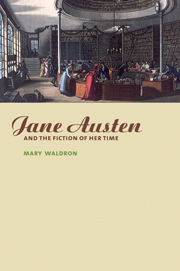Book contents
- Frontmatter
- Contents
- Acknowledgements
- Texts and abbreviations
- Introduction
- 1 The juvenilia, the early unfinished novels and Northanger Abbey
- 2 The non-heiresses: The Watsons and Pride and Prejudice
- 3 Sense and the single girl
- 4 The frailties of Fanny
- 5 Men of sense and silly wives – the confusions of Mr Knightley
- 6 Rationality and rebellion: Persuasion and the model girl
- 7 Sanditon – conclusion
- Notes
- Bibliography
- Index
- Frontmatter
- Contents
- Acknowledgements
- Texts and abbreviations
- Introduction
- 1 The juvenilia, the early unfinished novels and Northanger Abbey
- 2 The non-heiresses: The Watsons and Pride and Prejudice
- 3 Sense and the single girl
- 4 The frailties of Fanny
- 5 Men of sense and silly wives – the confusions of Mr Knightley
- 6 Rationality and rebellion: Persuasion and the model girl
- 7 Sanditon – conclusion
- Notes
- Bibliography
- Index
Summary
I do not write for such dull elves
As have not a great deal of ingenuity themselves
(Letters, 29 January, 1813, p. 298).‘ “It is really very well for a novel.” – Such is the common cant.’ Jane Austen's defence of the novel in Northanger Abbey brings together her abiding obsession with fiction and her deep dislike of the expression of unexamined fashionable opinion. But despite her spirited support of her fellow-novelists here, her letters and other family documents show that she by no means considered them innocent of certain kinds of ‘cant’ themselves; her trenchant criticisms of the novels that she discusses with Cassandra and other members of her family often identify stereotypical characters and events which she considered had no credible existence outside the accepted world of the contemporary novel; the denunciations ‘unnatural’, ‘improbable’, even ‘absurd’, appear frequently, occasionally applied even to novels she enjoyed. ‘I do not like a Lover's speaking in the 3d person; – it is too much like the formal part of Lord Orville [the hero of Burney's Evelina], and I think it is not natural’, she writes to her niece Anna in 1814, giving her advice on the writing of her own novel. Other contemporary writers come in for stronger castigation. In Mary Brunton's Self-control, the heroine, a young lady of great strength of mind and unassailable virtue, is abducted by her dissolute lover and taken to Canada, where she only escapes his attentions by floating alone down a river in a convenient canoe.
- Type
- Chapter
- Information
- Jane Austen and the Fiction of her Time , pp. 1 - 15Publisher: Cambridge University PressPrint publication year: 1999



